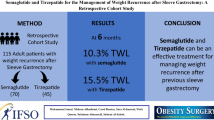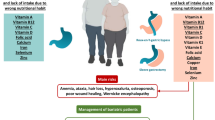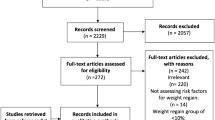Abstract
Background
Epidemiological findings have shown the rise of the prevalence of obesity in several segments of the world population, and more recent evidences point to a possible association with vitamin A deficiency (VAD). The aim of this study was to investigate vitamin A nutritional status in individuals with class III obesity in the preoperative period and 30 and 180 days after Roux-en-Y gastric bypass, correlating these findings with lipid profile and body mass index (BMI).
Methods
The sample was composed of class III obese individuals, males and females, in the preoperative period (T1) and 30 (T2) and 180 days (T3) after bariatric surgery with 5,000 IU of supplementation of retinol acetate. Vitamin A nutritional status was assessed through biochemical indicators (retinol and β-carotene serum levels), which were quantified by high-performance liquid chromatography with an inadequacy cutoff of <1.05 μmol/L and ≥40 μg/dL, respectively.
Results
Out of the 114 assessed patients, the mean age was 36.9 ± 11.6 years and BMI was ≥40 kg/m2. The prevalence of VAD was 14%, being 37.5% in T1, 50.8% and 67.8% in T2, and 52.9% and 67% in T3, according to retinol and serum β-carotene, respectively. A decrease of retinol and β-carotene serum levels was observed with BMI increase in T1. An increase of very-low-density lipoprotein cholesterol (VLDLc) and triglycerides was verified with the increase of retinol, being VLDLc in T3 and triglycerides in T1 and T2. In T1, high-dense lipoprotein cholesterol presented a positive and significant correlation with β-carotene and a negative and significant correlation in T3.
Conclusion
High prevalence of VAD in the preoperative period and in 30 and 180 postoperative days, even during supplementation, with higher inadequacy of β-carotene in all the three studied time periods, probably occurred because of its bioconversion to retinol due to the increased demand to which those individuals were exposed. It is suggested that the oral intake supplementation does not present the expected impact, and the need of assessing the nutritional status of vitamin A in the pre- and postoperative Roux-en-Y gastric bypass is emphasized. High prevalence of VAD in T1, with severity in T2 and T3, corroborates the utilization of the cutoff of <1.05 μmol/L as a VAD marker in the studied segment and reinforces its utilization as a tool in clinical practice to identify VAD in morbid obese patients who underwent bariatric surgery.
Similar content being viewed by others
References
Halpen A. Fisiologia da Obesidade (Physiology of Obesity). In: Garrido Júnior AB, Ferraz EM, Barroso FL, et al., editors. Cirurgia da obesidade (Obesity Surgery). São Paulo: Atheneu; 2003. p. 9–12.
Bender R, Zeeb H, et al. Causes of death in obesity: relevant increase in cardiovascular but not in all-cancer mortality. J Clin Epidemiol. 2006;59:1064–71.
Fundação Instituto Brasileiro de Geografia e Estatística (IBGE). Pesquisa de orçamentos familiares 2002–2003: Análise da disponibilidade domiciliar de alimentos e do estado nutricional no Brasil (Research of family budgets: 2002–2003: Analysis of home availability of foods and of the nutritional status in Brazil). Rio de Janeiro: Ministério do Planejamento e Orçamento/IBGE; 2004.
Freedman DS, Khan LK, Serdula MK, et al. Trends and correlates of class 3 obesity in the United States from 1990 through 2000. JAMA. 2002;188:1758–61.
Coutinho WF, Benchimol AK. Obesidade mórbida e afecções associadas (Morbid obesity and associated infections). In: Garrrido-Júnior AB, Ferraz EM, Barroso FL, et al., editors. Cirurgia da obesidade (Obesity Surgery). São Paulo: Ed Atheneu; 2003. p. 13–7.
Bloomberg RD, Fleishman A, et al. Nutritional deficiencies following bariatric surgery: what have we learned? Obes Surg. 2005;2:145–54.
Brolin RE, Leung M. Survey of vitamin and mineral supplementation after gastric bypass and biliopancreatic diversion for morbid obesity. Obes Surg. 1999;2:150–4.
Malinowski SS. Nutrition and metabolic complications of bariatric surgery. Am J Med Sci. 2006;4:219–25.
Slater GH, Ren CJ, Siegel N, et al. Serum fat-soluble vitamin deficiency and abnormal calcium metabolism after malabsorptive bariatric surgery. J Gastrointest Surg. 2004;1:48–55.
Horner MR, Dorea JG, Pereira MG, et al. Inquérito dietético com base no consumo familiar: o caso de Ilhéus, Bahia, Brasil, em 1979 (Dietary inquiry with basis on family consumption: the case of Ilhéus, Bahia, Brazil, in 1979). Arch Latinoam Nutr. 1981;31:726–39.
Santos LMP, Asciutti LS, Dricot DC. Exophthalmia in the state of Paraíba, northeast of Brazil clinical findings. Am J Clin Nutr. 1983;38:139–44.
United Nations Children’s Fund. Vitamin A and mineral deficiency: a global assessment. New York; 2004.
Institute of Medicine. Vitamin A. In: Dietary reference intakes for vitamin A, vitamin K, arsenic, boron, chromium, copper, iodine, iron, manganese, molybdenum, nickel, silicon, vanadium, and zinc. Washington, DC: National Academy Press; 2001. p. 82–161.
Singh RB, Niaz MA, Bishnoi I, et al. Diet, antioxidant vitamins, oxidative stress and risk of coronary artery disease: the Peerzada prospective study. Int J Cardiol. 1994;5:453–67.
Mosca L, Rubenfire M, Mandel C, et al. Antioxidant nutrient supplementation reduces the susceptibility of low density lipoprotein to oxidation in patients with coronary artery disease. J Am Coll Cardiol. 1997;30:392–9.
Viroonudomphol D, Pongpaew P, Tungtrongchitr R. The relationships between anthropometric measurements, serum vitamin A and E concentrations and lipid profiles in overweight and obese subjects. Asia Pac J Clin Nutr. 2003;1:73–9.
Switzer BR, Atwood JR, Stark AH, et al. Plasma carotenoid and vitamins A and E concentrations in older African American women after wheat bran supplementation: effects of age, body mass and smoking history. J Am Coll Nutr. 2005;3:217–26.
Silva LSVL, Veiga GVV, Ramalho RA. Association of serum concentrations of retinol and carotenoids with overweight in children and adolescents. Nutrition. 2007;23:392–7.
Quaranta L, Nascimbeni G, Semenaro F, et al. Severe corneoconjunctival xerosis after biliopancreatic bypass for obesity (Scopinaro’s operation). Am J Ophthalmol. 1994;118:817–8.
Huerta S, Rogers LM, Li Z, et al. Vitamin A deficiency in a newborn resulting from maternal hypovitaminosis A after biliopancreatic diversion for the treatment of morbid obesity. Am J Clin Nutr. 2002;76:426–9.
Hatizifotis M, Dolan K, Newbury L, Fielding G. Symptomatic vitamin A deficiency following biliopancreatic diversion. Obes Surg. 2003;4:655–7.
Chae T, Foroozan R. Vitamin A deficiency in patients with a remote history of intestinal surgery. Br J Ophthalmol. 2006;90:955–6.
Sarni RO, Ramalho RA. Serum retinol and total carotene concentrations in obese children. Med Sci Monit. 2005;11:510–4.
WHO. Obesity: preventing and managing the global epidemic. Report of WHO consultation on obesity. Geneva: World Health Organization; 1998.
NIH Consensus Development Conference Draft Statement. Gastrointestinal surgery for severe obesity. Obes Surg. 1991;1:257–65.
WHO. Global prevalence of vitamin A. Indicators for assessing vitamin A deficiency and their application in monitoring and evaluating intervention programmers. Micronutrient Series, WHO/NUT. 10. Geneva: WHO; 1996.
Sommer A. La carencia de vitamina A y sus consecuencias. Guía práctica para la detección y el tratamiento Vitamin A deficiency and its consequences. Practical guide for detection and treatment). Genebra: OMS; 1995.
International Vitamin A Consultative Group (IVACG). IVACG Statement. Maternal night blindness: a new indicator of vitamin A deficiency. Washington, DC: IVACG; 2002.
Sauberlich HE, Hodges RE, Wallace DL, et al. Vitamin A metabolism and requirements in the human studied with the use of labeled retinol. Vitam Horm. 1974;32:251–75.
IV Diretriz Brasileira Sobre Dislipidemias e Prevenção da Aterosclerose (IV Brazilian Guideline on Dyslipidemias and Prevention of Atherosclerosis). Arq Bras Cardiol. 2007;88:s.1.
Ford ES, Giles WH, Mokdad AH. Increasing prevalence of the metabolic syndrome among US adults. Diabetes Care. 2004;10:2444–9.
Crerand CE, Wadden TA, et al. A comparison of weight histories in women with class III vs. class I–II obesity. Surg Obes Relat Dis. 2006;2:165–70.
Must A, Jacques PF, Dallal GE, et al. Long-term morbidity and mortality of overweight adolescents: a follow-up of the Harvard Growth Study 1922 to 1935. N Engl J Med. 1992;327:1350–5.
Queiróz E, Ramalho RA, et al. Vitamin A status in diabetic children. Diabetes Nutr Metab. 2000;4:125–7.
West CE. Meeting requirements for vitamin A. Nutr Rev. 2000;58:341–5.
Baltasar A. Definición: ¿Qué es la obesidad grave? (What is severe obesity?). In: Obesidad y Cirugía - como dejar de ser obeso (Obesity and Surgery—how not to be obese any longer). 1st ed. Madrid: Editora Arán; 2000. p. 15–21.
Polacow VO, Lancha AH Jr. Dietas hiperglicídicas: efeitos da substituição isoernergética de gordura por carboidratos sobre o metabolismo de lipídios, adiposidade corporal e sua associação com atividade física e com o risco de doença cardiovascular (Hyperglicidic diets: effects of isoenergetic substitutions of fat by carbohydrates on lipid metabolism, body adiposity and their association with physical activity and with the risk for cardiovascular disease). Arq Bras Endocrinol Metabol. 2007;51:389–400.
Sorensen TI. The changing lifestyle in the world: body weight and what else? Diabetes Care. 2000;2:1–4.
Butte NF. The role of breastfeeding in obesity. Pediatr Clin North Am. 2001;1:189–98.
Sarni RS, Kochi C, et al. Impact of vitamin A megadose supplementation on the anthropometry of children and adolescents with non-hormonal statural deficit: a double-blind and randomized clinical study. Int J Vitam Nutr Res. 2003;73:303–11.
Matsuoka H. Endothelial dysfunction associated with oxidative stress in human. Diabetes Res Clin Pract. 2001;54:S65–72.
Ramalho RA, Flores H, Accioly E, et al. Deficiência de vitamina A no Brasil (Deficiency of vitamin A in Brazil). Soc Iber Nutr. 2005.
Mecocci P, Polidori MC, Troiand L, et al. Plasma antioxidants and longevity: a study on healthy centenarians. Free Radic Biol Med. 2000;28:1243–8.
Rodriguez-Amaya DB. Food carotenoids: analysis, composition and alterations during storage and processing of foods. Forum Nutr. 2003;56:35–7.
Higa KD, Boone KD, Ho T. Laparoscopic Roux en Y gastric bypass for morbid obesity: technique and preliminary results of our first 400 patients. Arch Surg. 2000;135:1029.
Cruz M, Marimoto IMI. Intervenção nutricional no tratamento cirúrgico da obesidade mórbida: resultados de um protocolo diferenciado (Nutrition intervention in the surgical treatment of morbid obesity: results of a differentiated protocol). Rev Nutr. 2004;17:263–72.
Rhode B, McLean LD. Vitamin and mineral supplementation after gastric bypass. In: Deitel M, editor. (Chapter 19 Update) Surgery for the morbidly obese patient. Toronto: F-D Communications; 2000.
Cambi MPC. Avaliação nutricional e de qualidade de vida em pacientes submetidos à cirurgia bariátrica Nutritional and life quality assessment of patients submitted to bariatric surgery). Master thesis of the Post-Graduation. Program - UFSC: Florianópolis; 2001.
Blomhoff R. Transport and metabolism of vitamin A. Nutr Rev. 1994;52:13–23.
Christian P, West JR, et al. Maternal night blindness increases risk of mortality in the first 6 months of life among infants in Nepal. J Nutr. 2001;131:1510–2.
Zemora S, Diego J. Antioxidantes. Micronutrientes en lucha por la salud (Antioxidants. Micronutrients in fight for health). Rev Chil Nutr. 2007;34:17–26.
Karlsson J, Sjöström L, Sullivan M. Two-year follow up of health-related quality of life (HRQL) and eating behavior after gastric surgery for severe obesity: Swedish Obese Subjects (SOS)—an intervention study of obesity. Int J Obes Relat Metab Disord. 2005;22:113–26.
Carvalho OS, Moreira CLCB, et al. Cirurgia bariátrica cura síndrome metabólica? (Does bariatric surgery cure metabolic syndrome?). Arq Bras Endocrinol Metabol. 2007;51:78–85.
National Cholesterol Education Program (NCEP) Expert Panel on Detection, Evaluation, and Treatment of High Blood Cholesterol in Adults (Adult Treatment Panel III). National Cholesterol Education Program National Heart, Lung, and Blood Institute. Bethesda: National Institutes of Health NIH Publication; 2002.
Leborgne L, Maziere JC, Maziere C. Oxidative stress, atherogenesis and cardiovascular risk factors. Arch Mal Coeur Vaiss. 2002;9:805–14.
Serban MG, Negru T. Lipoproteins, lipidic peroxidation and total antioxidant capacity in serum of aged subjects suffering from hyperglycemia. Rom J Intern Med. 1998;36:65–70.
Toikka JO, Ahotupa M, Viikari JS, et al. Constantly low HDL-cholesterol concentration relates to endothelial dysfunction and increased in vivo LDL-oxidation in healthy young men. Atherosclerosis. 1999;147:133–8.
Baena RM, Campoy C, et al. Vitamin A, retinol binding protein and lipids in type 1 diabetes mellitus. Eur J Clin Nutr. 2002;56:44–50.
Santos HS, Cruz WM. A terapia nutricional com vitaminas oxidantes e o tratamento quimioterápico oncológico (Nutritional therapy with oxidant vitamins and the oncological chimiotherapic treatment). Rev Bras Cancerol. 2001;3:303–8.
Author information
Authors and Affiliations
Corresponding author
Rights and permissions
About this article
Cite this article
Pereira, S., Saboya, C., Chaves, G. et al. Class III Obesity and its Relationship with the Nutritional Status of Vitamin A in Pre- and Postoperative Gastric Bypass. OBES SURG 19, 738–744 (2009). https://doi.org/10.1007/s11695-008-9478-y
Received:
Accepted:
Published:
Issue Date:
DOI: https://doi.org/10.1007/s11695-008-9478-y




